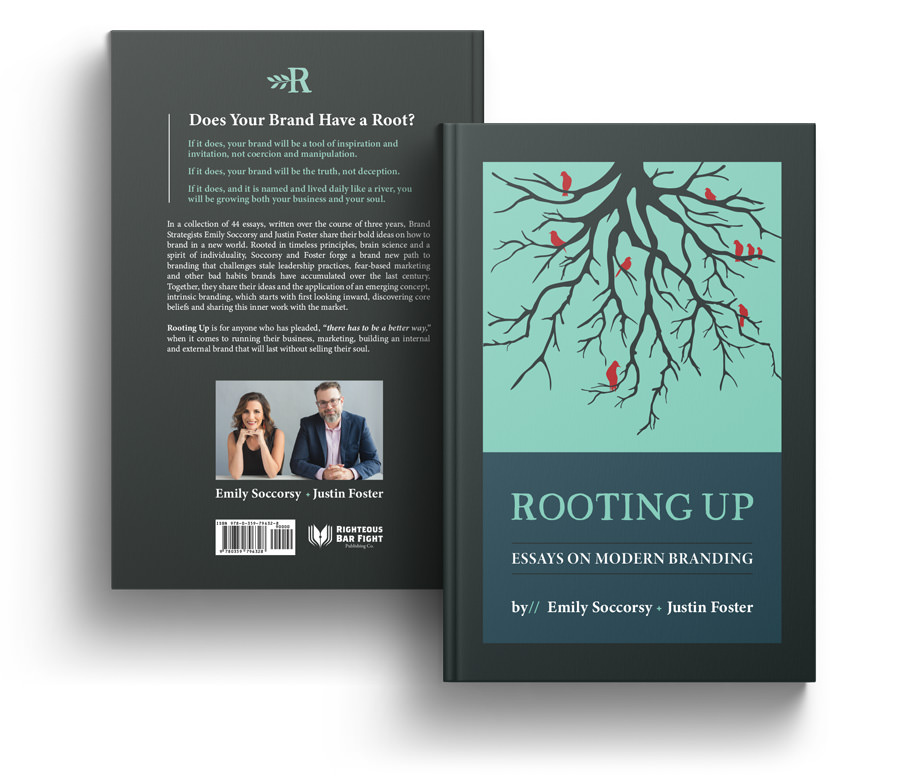Filed Under: 21st Century Branding, Intrinsic Branding, Leadership
By Emily Soccorsy

The idea of influence has been twisted up in recent years.
Once used to describe an emanating power, it has now (with an “r” added to its end) morphed into a person skilled at presenting oneself in a desirable, polished, and overly perfected way. This presentation of self is designed to change the thinking or behavior of whole groups of other people, mainly for commercial purposes.
Influencers are ultimately salespeople—excellent at convincing others of the value of another’s products based on their apparent likability, charisma, or projected perfection in life.
But influence, at its essence, is a whole other thing.
It’s essential, of the spirit, capable of stirring souls.
Influence is part presence, part self-awareness, and part expression.
How we choose to assert our influence is one of the most innate, precious, and important parts of being human.
Yet, it is one of the most overlooked abilities we have.
Oddly, our collective tendency is to downplay our influence. Over the years, I’ve noticed consistently how most people reduce the unique presence, perspective, and energy they bring to every situation.
They don’t see what makes them unique. (“I’m just like everyone else.”)
They overlook how people respond to them. (“I didn’t say anything special.”)
They dismiss their magic. (“Anyone can do that.”)
They diminish their contributions. (“I didn’t do anything special.”)
I’m not sure of the origin of this reductive tendency. It could be partly learned (As author Paulo Coelho writes in the forward to The Alchemist, ‘From childhood onward we are told everything we want to do is impossible.’) and part inherent, but it’s undoubtedly there.
Ultimately, this tendency means influence has gone to waste.
It’s still there, but we haven’t used it. We haven’t been aware enough of it to wisely put it to work. Or, we’ve become disillusioned by all the times when our influence didn’t seem to get through to someone we cared about.
Influence is deeply tied to our ability to be present, and to be aware of our presence.
Earlier this year, I became incredibly busy with all of the doing I was responsible for. I was increasingly disconnected from my ability to be present. In the absence of presence, my mind was constantly rushing to solve problems, to be more efficient, to solve, to put out the fire in front of me. I became exhausted and unnerved.
I did not take time to pause, meditate, and be a human breathing in a body.
After spending a few days away in late spring, I was able to slow down. I began daily, to be still, breathe and practice presence. Then things started to change in all the ways. I could touch into my surface presence and my deeper presence, what I call the deep self. I could remain calm in the face of difficulty. I could enjoy my life, bit-by-bit, a little more.
My spirit became lighter. My heart became quieter. My universe of soul began to experience sunrise again.
Once practiced, presence gives way to greater self-awareness.
When we are present, we can become aware of how, when, and who we influence.
This is self-awareness in action. We can give the gifts of our self, our heart, our thoughts. We can be a witness, a supporter, a guide to fellow humans on the journey.
We can do what Ram Dass sagely observed,
“We’re all just walking each other home.”
The longer I live, the more I become convinced this metaphorical walk is a sizable part of our essential, shared purpose on earth.
When I am with another person in presence and self-awareness, I often think, “how do I walk this person home in this moment? How do I truly see them and make them feel that? How can I listen deeper?”
When I am grounded, I know my influence. I know how showing up as positive, open and organized impacts other people. I become aware of the thoughts that arise from my heart or the depths of my mind to share with others – and how it may help support them.
I am aware of my influence.
Finally, influence is about expression.
My husband recently spent time with an acquaintance we haven’t seen for at least two decades, not since my husband’s father died tragically.
This friend approached my husband and told him, “I never told you this, but when your dad died, that was a real turning point for me. It woke me up. My relationship with my dad was distant and strained at the time. And I realized I needed to do something about that, so I set out to change that relationship, and I did. And I just wanted you to know that.”
The desire to hide our pain, our disappointments, and the difficult moments in our lives is strong.
I want to retreat every time I face pain and difficulty. I want to paper over my hurting self to protect her, to tuck her away, and to present something more palatable (Happy person! Capable person! No burden to you!) to the world around me.
But when we hide the truth of what we are going through, we lose the influence experience brings.
We lose the human-to-human connection it presents. We forfeit our potential to heal others.
To fully tap into influence, we must be present, self-aware, and conscious of what we choose to express—because we are responsible for our power over others.
To build your influence in a meaningful way, don’t look for sponsors.
Sponsor yourself.
Have an honest conversation with yourself about how you are present (or not). This will give you the grounding you need to influence from truth.
Take stock of your self-awareness. This will arm you with confidence in who you are and the impact you can have on others.
Lastly, be intentional about what you want to express to the world – or to one other person. Your words and experiences are the most precious currency you have.
Adding intention to them will superpower their impact.
